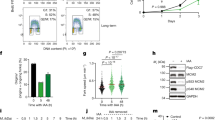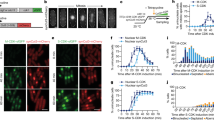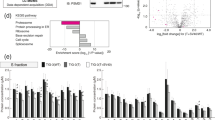Abstract
We have performed biochemical analyses of cdk6 complexes in T cells. By gel filtration chromatography we observed at least three cdk6 containing complexes in the cell, the most abundant eluting at 450 kDa and 50 – 70 kDa and a minor complex eluting at 170 kDa. Cyclin D was present in the minor 170 kDa complex which co-eluted with the peak of cdk associated in vitro Rb kinase activity. Analysis of proteins that co-immunoprecipitated with cdk6 showed that the 450 kDa complex contained both Hsp90 and CDC37. The 50 – 70 kDa complex was made up of two moieties, a 66 kDa complex containing cdk6 bound to p19INK4d and monomeric cdk6. The subcellular localisation of the cdk6 complexes was analysed by preparing cytoplasmic and nuclear extracts. The 450 kDa complex was shown to be predominantly cytoplasmic, whereas the 170 kDa cyclin D/cdk6 and the 50 – 70 kDa complexes were present in both nuclear and cytoplasmic compartments. When these same extracts were assayed for cdk6 associated kinase activity, only the nuclear cdk6 complexes were active. These data suggest that even though there are cdk6/cyclin D complexes detectable in both the cytoplasm and nucleus, only the cdk6 that is in the nucleus is active.
This is a preview of subscription content, access via your institution
Access options
Subscribe to this journal
Receive 50 print issues and online access
$259.00 per year
only $5.18 per issue
Buy this article
- Purchase on Springer Link
- Instant access to full article PDF
Prices may be subject to local taxes which are calculated during checkout
Similar content being viewed by others
Author information
Authors and Affiliations
Rights and permissions
About this article
Cite this article
Mahony, D., Parry, D. & Lees, E. Active cdk6 complexes are predominantly nuclear and represent only a minority of the cdk6 in T cells. Oncogene 16, 603–611 (1998). https://doi.org/10.1038/sj.onc.1201570
Received:
Revised:
Accepted:
Published:
Issue Date:
DOI: https://doi.org/10.1038/sj.onc.1201570
Keywords
This article is cited by
-
Expression of cdk6 in head and neck squamous cell carcinoma
Clinical Oral Investigations (2016)
-
Mammalian cell-cycle regulation: several Cdks, numerous cyclins and diverse compensatory mechanisms
Oncogene (2009)
-
Amplification at 7q22 targets cyclin-dependent kinase 6 in T-cell lymphoma
Leukemia (2008)
-
Transforming activity of Fbxo7 is mediated specifically through regulation of cyclin D/cdk6
The EMBO Journal (2005)
-
Anti-migratory and anti-angiogenic effect of p16: A novel localization at membrane ruffles and lamellipodia in endothelial cells
Angiogenesis (2004)



